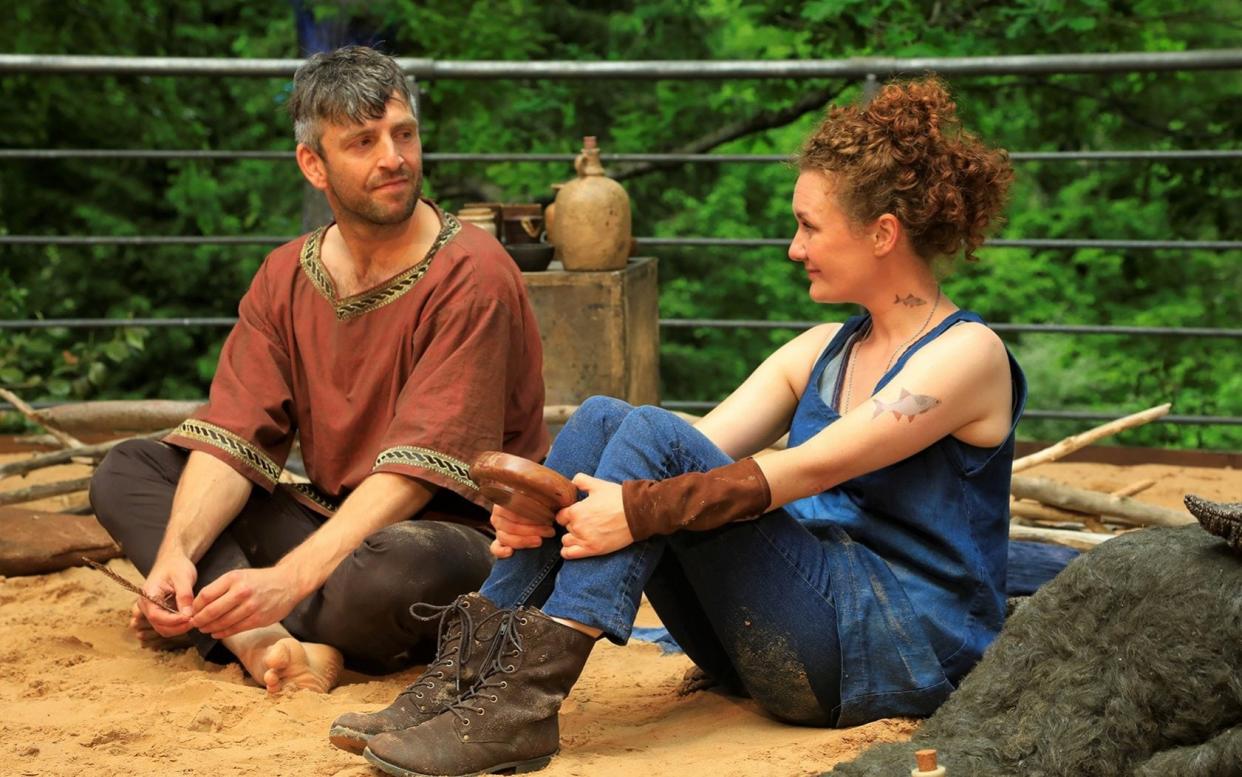Adventures with the Painted People, Pitlochry Festival Theatre, review: not David Greig’s finest hour

- Oops!Something went wrong.Please try again later.
- Oops!Something went wrong.Please try again later.
- Oops!Something went wrong.Please try again later.
A powerful, Scottish woman and an influential man who speaks Latin meet in the village of Kenmore in Perthshire. On this premise, one could be forgiven for thinking that Adventures with the Painted People, the latest drama by acclaimed playwright David Greig, is about a political summit between Nicola Sturgeon and Boris Johnson.
However, this two-handed play (which began its life as an audio drama, broadcast on BBC Radio 3 in June of last year) is set around 2,000 years ago. Its protagonists, Eithne and Lucius, are, respectively, a Fife-born witch and a captured Roman soldier.
Greig is the author of a great many plays, ranging from the political classic Europe to the moving Holocaust drama Dr Korczak’s Example. In recent years, the first call on his considerable energies has been his role as artistic director of Edinburgh’s Royal Lyceum Theatre. Indeed, Adventures with the Painted People is his first original play since 2013.
In the piece, Eithne (a non-Caledonian) is operating as a freelance witch for the Caledonian “Salmon People” of north Perthshire. Lucius is tied up and, Eithne assures him, surrounded by deadly curses. He is to be a bargaining chip in the sorceress’s planned peace-talks with the Roman governor.
The relationship that ensues between the two is a sometimes comic, sometimes thought-provoking clash of cultures. There could hardly be a starker contrast than that between the brutal logic of imperial Rome (too many straight lines, says Eithne) and the poetic mysticism of the Caledonians. This fact is rendered all the starker when the witch turns critic, telling Lucius that his rigidly observational poetry is “insipid”.
One can see the play’s Covid-era radio origins in its modesty of scale. The piece is directed by Elizabeth Newman, artistic director of Pitlochry Festival Theatre, who has fashioned a production that is as crisp and tight as Greig’s two-act structure demands. The play benefits enormously from being presented in the little outdoor amphitheatre, gorgeous and ingenious, that Newman has had built in the glorious Explorers Garden, which sits adjacent to her theatre. As the iridescently brilliant Kirsty Stuart (Eithne) and the suitably stoical, if occasionally over-stretched Nicholas Karimi (Lucius) play in the circular sandpit set, it isn’t difficult to imagine ourselves in a Perthshire forest in the first century AD.
The work of music and sound designer Ben Occhipinti is admirably illustrative and unobtrusive. Likewise the contribution of lighting designer Jeanine Byrne, who interacts excellently with the venue’s natural light. The costume designs, which nod cursorily to the period, are so minimal that no-one is credited with them. But something about the outdoor roughness and reaching-beyond-Covid optimism of the production makes you forgive the velvet cloak and blue jeans haphazardness.
Ultimately, Greig’s flights of historical fancy are no more bizarre than those of Shakespeare or a modern playwright such as Howard Barker. Ironically, it’s in the play’s too-obvious romantic dimension that one’s credulity is put under greatest strain. Greig is one of the most cerebral playwrights of the 1990s set of British dramatists who were misnamed the “in-yer-face” generation. Enjoyable and often compelling though it is, Adventures with the Painted People is unlikely to be remembered as one of his greatest plays.
Until July 4. Info: pitlochryfestivaltheatre.com

